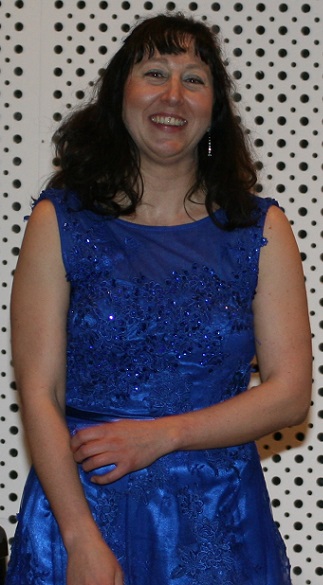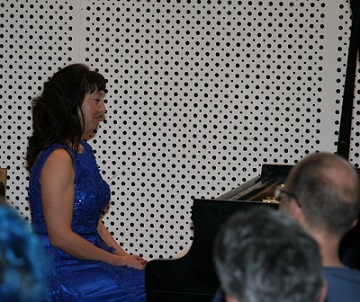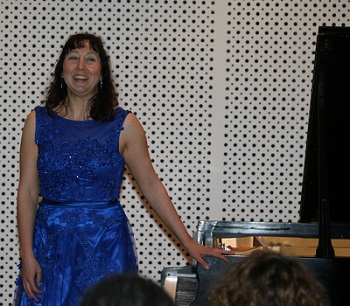Pianist star Diana Brekalo, who by her musicianship and virtuosity inspired the leading English composers Christopher Gunninag and Peter Fribbinas to write works especially for her, while Croatian composer Milko Kelemen entrusted her with the premiere performance of his Sonata oubliée in London, and the German composer Hubertus Schwinge with recording his works on four albums, for her piano recital in Germany and in London she chose works by female composers from the nineteenth century and the beginning of the twentieth century. The concerts titled Rebellious Female Composers she performed in Liederhalle in Stuttgart on March 10th and in the Lancaster Hall in London on March 14th.
In the Liederhalle in Stuttgart, the enthusiastic audience did not stop with loud ovations and thunderous applause as an expression of sincere joy and gratitude after each performance.
Diana Brekalo introduced herself to the audience in Liederhalle not only as an excellent pianist, but also as an excellent presenter, introducing each composer individually. She chose interesting and key details from their biographies that best characterize them; their personality and approach to music. She told about Fanny Mendelssohn-Hensel, that her father did not allow her to perform in public, so her brother Felix performed her works under his own name, while Clare Schumann’s father strongly encouraged her to compose.
Brekalo started the piano recital with two movements by Fanny Mendelssohn-Hensel work The Year: January The Dream and February Scherzo and at the very beginning she impressed the audience with her convincing and inspired interpretation,with her lightness and virtuoso octave performance. Brekalo emphasized how Anne de Belleville/Oury met the leading composers of her time, Beethoven, Chopin and Verdi, and played together with Paganini. In her composition Rigoletto Phantasy, these acquaintances are precisely reflected through the processing of recognizable themes by famous composers. Melanie Bonis sent her compositions to competitions where she won under the pseudonym M. Bonis, and the members of the jury considered that it was a male person. Lily Boulanger, with lasting health problems what can be felt in the melancholy of her works was the first woman – composer won a competition. It was Prix de Rome. Brekalo performed three movements from her Trois morceaux pour piano, with meditative parts and beautiful pianissimo. For Dora Pejačević, Brekalo pointed out that she was looking for new musical forms and that as a countess she could not identify with the social class to which she belonged by birth and how she spent most of her time in the company of artists and publicists. For the concert in the Liederhalle, Brekalo chose Sonata op. 57. by Pejacevic.
Diana Brekalo played each composition with lithness, dynamically impeccable, virtuoso and with a lot of feeling and expressiveness, and on the other hand temperament and energetic, but always very musically. Her pianissimo is beautiful, quiet but sonorous which few can achieve. She fantastically conveyed to the audience all that radiates from the performed works and all the feelings that she brought into the interpretation.
Her entire performance in the Liederhalle, from her first step on stage to taking a bow at the end, was a fantastic performance that captivated the audience from beginning to end. Diana Brekalo simply moved the audience with her performance, smile, immediacy, presentation of the pianists, posture and creation of a special atmosphere, which the audience rewarded with a standing ovation, everyone stood up in delight to pay her respects and thank her.
Following Diana Brekalo concert in London I spoke with her about her impressions of her London concert and about the resonance about the female composers
Diana Bekalo: The concert in London was also very successful. The audience was very excited about the stories of the lifes by the women composers. Their favorite music in the concert was the Pejacevic Sonata and the Rigoletto Phantasy by Anne de Belleville. They all thought it was throughout a fantastic concert, where they learnt a lot and were fascinated to discover some more music.
Jasna Lovrincevic:How did you do your research and scores for the female composers and their lifes!?
Diana Brekalo: It was quiet challenging to find the only biography about Dora Pejacevic written by Koraljka Kos. My cousin sent me a link to a second hand store in Zagreb, where I was able to order the Croatian version of the biography.
Some of the scores I was able to find on the Internet. However I did have a score which I received from the Croatian consular in Stuttgart a long time ago. During that time it was lead by Dr Vera Tadic and the cultural attache Mrs Belamaric. Apart from that I visited the Pejacevic castle in Osijek back in 2019 and actually was going to visit the Castle in Nasice in summer 2023. Unfortunately there were refurbishments at the castle at that time, so I am planning to continue my research this summer. I’ll be looking forward to see the grand piano on which she was practicing and composing. Apart from that I was also visiting the Mendelssohn House in Leipzig where I read a few letters by Fanny Mendelssohn and her father. It was very exciting and interesting to see the garden in which the famous garden concerts took place. I remember reading that Fanny used the possibility to perform her music at this concert. There are a few books and biographies however I feel it is missing more informations.
Jasna Lovrincevic: Do you feel a difference or something female like in their music?
Diana Brekalo: To be honest I don’t feel a difference while performing music by the female composers. Maybe the flower titles are more likely to be written by a female composer. However it was the best example that Melanie Bonis won a composition competition by signing her score as M. Bonis, so nobody assumed it could be a women writing such wonderful music.
I especially feel the second Sonata by Pejacevic and definitely Fanny Mendelssohn’s work have a strong and deep musical insight so it is worth performing it more in the future.
Diana Brekalo was born in Stuttgart, where her talent for music was recognized very early, she is the winner of several national and prestigious international competitions for pianists. She completed her music studies at the Guidhall School of Music and Drama in London, where she also obtained a Master of Music for performance.
She is engaged at the School of Music in Würzburg, gives master classes and she is a member of different pianist competition juries in Germany and England. Her performance of the Clara Schumman concerto was selected for the Canadian film The White Fortress, presented at the 2021 Berlinale International Film Festival.



